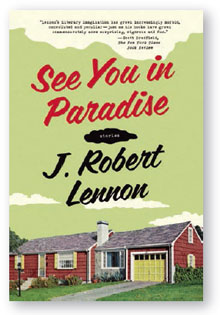 Featured |
See You in ParadiseJ. Robert Lennon (Graywolf)n his second collection of short fiction, the author of Familiar and Castle reveals the strangeness that lies beneath the surface of modern life. A malfunctioning portal to another universe opens in a backyard, an editor makes a bizarre deal with a CEO, and a roommate terrorizes the man he rents from. As one narrator observes, “The magic has to come from someplace, right? It’s out there, bestowing itself on somebody else’s wife, somebody else’s kids, somebody else’s life. All I want is to get a little of it back.” |
Dirty EntanglementsLouise I. Shelley ’72 (Cambridge).“The interaction of crime, corruption, and terrorism is having a tremendous impact on both security and the global economy,” writes the director of the Transnational Crime and Corruption Center at George Mason University. “Globalization has created a world where international businesses can combine in remote locales. But globalization has also created a world in which money, arms, and people move readily across borders, making such sites vulnerable.” She argues that companies are not only the victims of terrorist attacks, but also facilitate this activity through the payment of large ransoms to insurgent groups. Last Stories and Other StoriesWilliam T. Vollmann ’81 (Viking).“This is my final book,” writes the winner of the National Book Award for the novel Europa. Whether he means the remark seriously or in jest, he is preoccupied with death and the supernatural in this exhaustive—more than 650 pages long—collection of ghost stories. Several stories are set in the conflict zones where Vollmann has done reporting, especially Sarajevo (“Escape” and “Listening to the Shells”) during the Bosnian war, while other dark tales arise in such places as Japan (“The Cherry Tree Ghost”), eighteenth-century Trieste, and Mexico during Emperor Maximilian’s last moments. Love at First SiteErika Ettin ’03 (River Grove).The founder of A Little Nudge offers advice on dating, including tips about online profiles, what to do and not to do, e-mail etiquette, online safety, what to wear, who pays the check, and the importance of follow-up. “It will likely take some time to find the right person (and you may have to kiss a lot of frogs),” she writes, “but throughout the process, you learn what you like and what you don’t like. Love is out there, but it just takes some time and some work to find it.” A Ministry of PresenceWinnifred Fallers Sullivan ’71 (Chicago).“The role of the chaplain in American institutions today displays the idiosyncrasies of modern American religion in particularly revealing ways,” writes the chair of Religious Studies at Indiana University. The shift away from the traditional spiritual guidance of rabbis, ministers, and priests has, paradoxically, opened up a space for chaplains. Sullivan explores how chaplaincy sits uneasily at the intersection of law and religion, spiritual care, and government regulation. She argues that U.S. chaplains exemplify the “peculiar and shifting terrain framed by the religion clauses of the First Amendment.” Fiction2094John Lauricella (Irving Place).Eighty years in the future, J. Melmoth leads a life of leisure, and a microchip keeps him entertained. On Mars, “adepts” monitor life on Earth and seek the philosopher’s stone. But there’s a flaw in paradise: why does Melmoth’s microchip malfunction, and why can’t the alchemists on Mars turn base metals into gold? The Symmetry TeacherAndrei Bitov, translated by Polly Gannon, PhD ’97 (Farrar, Straus and Giroux).In a case where life imitates art, Gannon, a teacher in St. Petersburg, Russia, translates Bitov’s novel, in which the narrator tries to reconstruct his half-forgotten translation of an English novel. Non-FictionOberlin, Hotbed of AbolitionismJ. Brent Morris, PhD ’10 (North Carolina).Oberlin College was a center of abolitionism in antebellum America. One newspaper branded it a “manufactory of fanatics,” while to Frederick Douglass, whose son attended the school, it was a “Gibraltar of Freedom.” Morris, an assistant professor of history at the University of South Carolina, Beaufort, argues that Oberlin avoided the squabbles of Eastern abolitionists and maintained its radical fervor for reform. Does Every Woman Have an Eating Disorder?Stacey Rosenfeld ’95 (Siena Moon).A clinical psychologist who specializes in eating disorders and body image issues challenges Americans’ unhealthy fixation on food and weight. Enacting the CorporationMarina Welker (California).Using fieldwork in Indonesia and Denver, an assistant professor of anthropology at Cornell examines the interactions between corporate managers, villagers, NGOs, and government officials at Newmont Mining Corporation’s copper and gold mine in Sumbawa, Indonesia. Last-Minute Survival SecretsJoey Green ’80, BFA ’81 (Chicago Review).The author of The Ultimate Mad Scientist Handbook offers DIY tips on using everyday materials to deal with emergencies. He shows how to create a wi-fi antenna with a coffee can, start a fire with potato chips, build a solar cooker, and make a life vest from condoms. The King’s BodyNicole Marafioti, PhD ’09 (Toronto).An assistant professor of history at Trinity University examines the role of funerals in English succession, from the death of Alfred the Great through the Norman Conquest. |
|


